Fall/Winter 2025-26
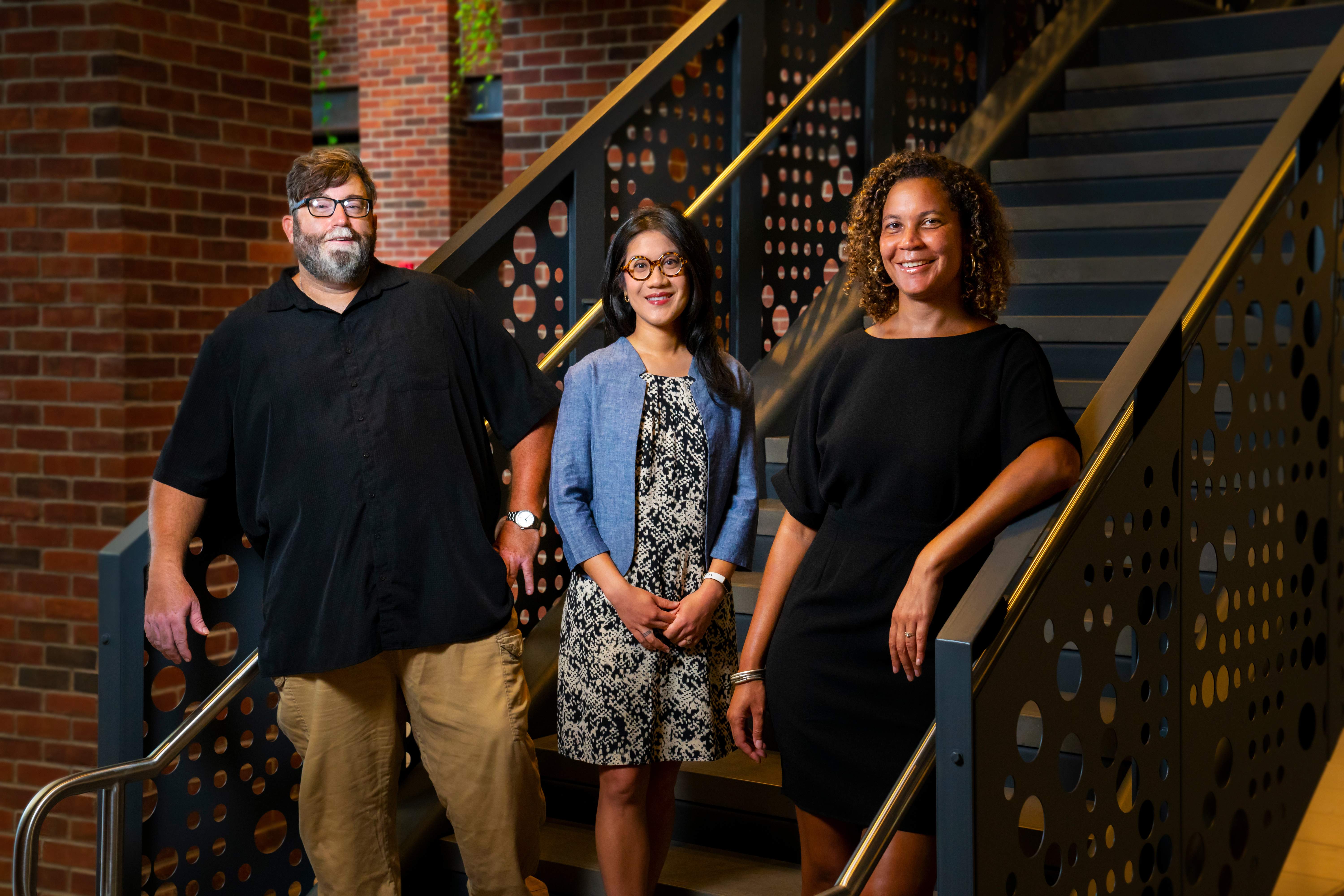
The Marist Mindset List, composed by a trio of Marist faculty, list focuses on a variety of academic disciplines where incoming students are making an impact, and its primary purpose is to give students, their faculty, and even their parents a sense of common ground to spark meaningful conversations, both in and out of the classroom.
The Class of 2026 has arrived, and this year’s group of incoming students has hit the ground running in hopes of being at the back end of the COVID-19 pandemic. This group comes to college having lived much of their high school years with disruptions and due to COVID-19 are looking for a sense of “normal.” This experience has been impactful to this new group of students, who like any incoming class, has a unique take on cultural references and interests.Each year, the Marist Mindset List is crafted as a “cultural compass” exploring the triumphs and challenges for incoming college students. Also known as the “always/never” list, the Marist Mindset List digs into topics spanning public health in addition to political, computer, and environmental sciences as well as fashion and diversity, and equity and inclusion. The list features 10 items in all, which include additional reading in the form of links to sources and, in some cases, living examples of items. Much of the Class of 2026 was born in 2004, so cultural references were entered with that in mind.The list is compiled each year by the Marist Mindset team of Tommy Zurhellen, associate professor of English; Dr. Vanessa Lynn, assistant professor of criminal justice; and Joyce Yu-Jean Lee, assistant professor of art and digital media.“The Marist Mindset List for the Class of 2026 is particularly interesting to me, because we’re seeing how incoming students react to the gradual end of the pandemic that has already affected their academic paths in so many ways,” said Zurhellen. “COVID may be waning, but COVID fatigue is still very much a factor in the choices our students make. This year’s list certainly reflects that unique trend.”“While every Marist Mindset List has explored what touches and impacts an incoming class, this year we also see how many of the phenomena listed impact so many of us,” said Lynn, Marist Mindset Faculty Fellow. “I'm excited about that, because the list can be truly intergenerational.”The annual Mindset List was created at Beloit College in Wisconsin to reflect the world view of entering first year students—and to help faculty understand incoming classes. In 2019, the list moved to Marist, becoming the Marist Mindset List. Under the direction of Zurhellen, who is a Beloit alumnus, the list has become a collaborative effort each year with Marist faculty and students from different disciplines with diverse backgrounds.The 2022 Marist Mindset List for the Class of 2026Sports CommunicationThe Class of 2026 has always known LeBron James as the most recognizable sports icon on the planet. LeBron James entered the NBA in 2003 and in 2004, the year many of the Class of 2026 were born, his jersey topped the best-seller list for the first time; in 2022, James’s jersey still tops the list.Political ScienceFor incoming students, Hillary Clinton has always had a more significant role in American politics than Bill Clinton. Although older Americans may think of Hillary Clinton as primarily First Lady from the 1990s, incoming students born in 2004 only know her as a United States senator, secretary of state, and contemporary presidential candidate.Computer ScienceCreated in 2004, Facebook has been active for the entire lives of the Class of 2026. Although Facebook is only 19 years old, many incoming students already see the social media platform as outdated, preferring newer platforms such as TikTok and Instagram.EthicsIncoming students are the first generation in 50 years who must include their own reproductive rights as part of their overall college decision. The recent Supreme Court decision to overturn Roe v. Wade will affect so many decisions for young women, who currently make up 59 percent of college students in America.Global StudiesThe Class of 2026 will be the first since the “Duck and Cover” generation of the Cold War to live with the real possibility of world war and global conflict. The Russian invasion of Ukraine echoes the experiences of growing up during the Cold War, but today’s digital technology makes the images of war much more visceral.Environmental ScienceThe debate on climate change is over. Incoming students are now the first generation faced with the omnipresent reality to actually effect change to combat global warming. Greta Thunberg has set the stage for youth activism; now, incoming students are part of a new generation increasingly demanding legal reforms to improve future generations’ lives. Diversity, Equity, and InclusionThe Class of 2026 is the first cohort in recent memory for whom knowledge about a diverse country and world is actually regressing. Thirty-five states have recently introduced and/or passed legislation to either ban or censor teaching about race, sexual orientation, gender identity, and American history in schools.Public HealthIncoming students are still recovering from the mental health impact of COVID and COVID fatigue. Mental health has been an issue for some time, but the Class of 2026 is still recovering from the effects of the pandemic on their mental health.EducationThe Class of 2026 is the first to realistically see the possibility of canceling or reducing student debt. The Biden administration has publicly announced its determination to tackle the rise of crippling student debt. Will they get results?FashionIncoming students are aware of fashion sustainability, but nevertheless social media and influencer culture draw them to cheaper and faster options from online retailers. Students have a better understanding of sustainability than previous generations, but their consumer choices do not reflect a strong commitment to protecting the environment.See a full breakdown of this year’s Marist Mindset List for the Class of 2026 here.
28 Oct 2022

This past fall, the innovative Marist Poll team accurately measured the winners in Senate and gubernatorial contests across the nation, thanks to new, scientific polling methodologies.
This fall, the Marist Poll team tracked public opinion in the most hotly contested Senate and gubernatorial races across the country, and the results were spot-on! The Marist Poll accurately measured the winners in each of the called U.S. Senate and gubernatorial contests polled this election cycle. The Marist Poll’s success this year is the result of the implementation of new, scientific polling methodologies aimed at addressing the broader challenges confronting the polling community.Always innovators in the field of survey research and academia, the Marist Poll rigorously tested these methodologies during the year prior to the 2022 midterms, and the effort proved fruitful. The Marist Poll looks forward to sharing the insights from its election polls with the broader survey community as well as the hundreds of student workers, interns, and researchers who are at the fore of the Marist Poll Survey Center every semester.With an eye on the key issues driving the electorate, the Marist Poll also tracked the 2022 midterm elections with its national polling partners, NPR and PBS NewsHour. The NPR/PBS NewsHour/Marist Poll measured public opinion on President Joe Biden’s job performance, the economy, the labor force, and much more. In total, the Marist Poll conducted 12 public battleground state polls and 2 national surveys since Sept. 1, generating an estimated ad value equivalency of more than $300 million, according to the media monitoring service Meltwater.Also last fall, it was the Marist Poll’s distinguished pleasure to participate in the Office of College Advancement’s October event for the Washington, DC, alumni chapter. These two action-packed days began with an informal dinner with Marist President Kevin Weinman and distinguished political journalists with whom the Marist Poll has worked over the decades. The Marist Poll also hosted a luncheon where Marist Poll alumni had the chance to get to know President Weinman. The culmination of the trip was the broader gathering of Marist’s DC alumni chapter during which Dr. Lee Miringoff, director of the Marist Institute for Public Opinion, had the distinct honor of leading the discussion between Weinman and Marist’s best and brightest. From Marist students past to the present, undergraduates in Miringoff’s Political Communication and Politics course have, once again, experienced an insider’s view of the field. On-campus and virtual guest speakers this semester have included Congressman Jamie Raskin, author of Unthinkable: Trauma, Truth, and the Trials of American Democracy and who served as the lead impeachment manager in the second impeachment trial of former President Donald Trump; Lisa Desjardins, PBS NewsHour correspondent; Steve Thomma, executive director of the White House Correspondents Association; David Lightman, chief congressional correspondent for McClatchy; and Ron Brownstein, CNN senior political analyst and senior editor at The Atlantic.The Marist Poll would also like to take a moment to thank Marist alumni, staff, and friends of the College who contributed to the Marist Poll’s GiveCampus campaign. Those generous donations funded two student fellowship positions. The Marist Poll Summer Fellow for Distinguished Service in Media was awarded to Greta Stuckey ’23 who demonstrated outstanding journalistic integrity, exemplary writing and research skills, a passion for the media industry, and proven leadership ability. Sarah Knauss ’23 was named the Marist Poll Summer Fellow for Distinguished Service in Data Science which is awarded to a Marist College student who demonstrates exceptional analytical writing and research skills, exhibits a strong interest in the field of survey research and/or data analysis, and is a proven leader. For those who might have missed it, the Marist Poll, in conjunction with the Marist Center for Sports Communication, surveyed Americans about Title IX, 50 years after the passage of this groundbreaking legislation. To commemorate the anniversary of Title IX in June, the Marist Poll and the Marist Center for Sports Communication hosted a virtual panel featuring female luminaries in sports, broadcasting, and policy. Marist Poll Director of Data Science and Technology Stephanie Calvano ’04 moderated the panel which included Margaret Dunkle, architect of Title IX; Aditi Kinkhabwala, former national reporter for the NFL Network; Rebecca Lobo, WNBA and women’s college basketball analyst and reporter for ESPN and former WNBA All-Star; Jane McManus, executive director of Seton Hall’s Center for Sports Media; and Julianne Viani ’08, basketball analyst in sports broadcasting for ESPN, CBS Sports Network, NBC Sports, and YES Network, as well as other networks.
15 Feb 2023
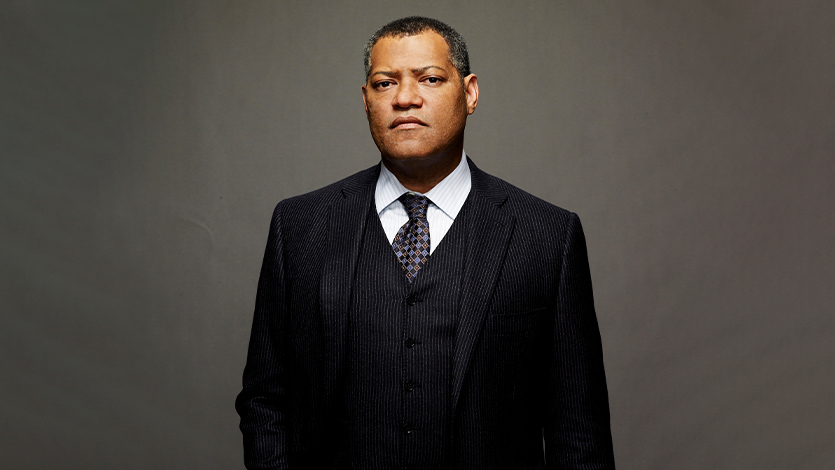
NYSAF will work with the College to lend professional expertise to its curricular programs as Marist students serve as interns and staff members.
New York Stage and Film at Marist College returns to Poughkeepsie July 14-August 6 for its 2023 Summer Season, which will feature a combination of emerging artists and Hollywood and Broadway headliners.
27 Mar 2023
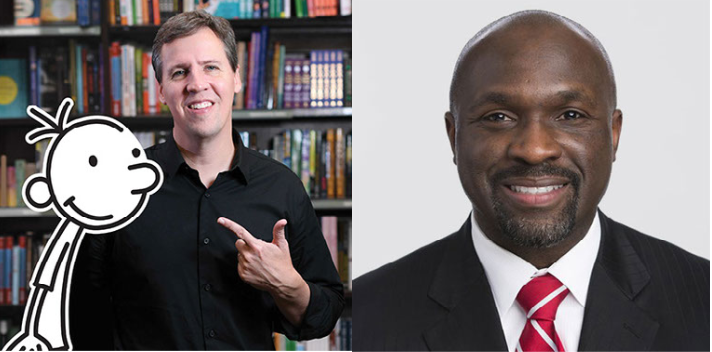
Best-selling author Jeff Kinney will address traditional undergraduates of the Class of 2023 at Marist’s commencement ceremony May 20 and adult undergraduate, master’s, and doctoral students will be honored the night before with Jerome Pickett ’98 as their commencement speaker.
Best-selling author of the popular Diary of a Wimpy Kid series and cartoonist Jeff Kinney will address traditional undergraduates of the Class of 2023 at Marist College’s Commencement ceremony on Saturday, May 20 on the Campus Green. Adult undergraduate, master’s and doctoral students will be honored the night before, with esteemed Class of 1998 Marist alumnus, Jerome Pickett, serving as Commencement speaker.
28 Mar 2023
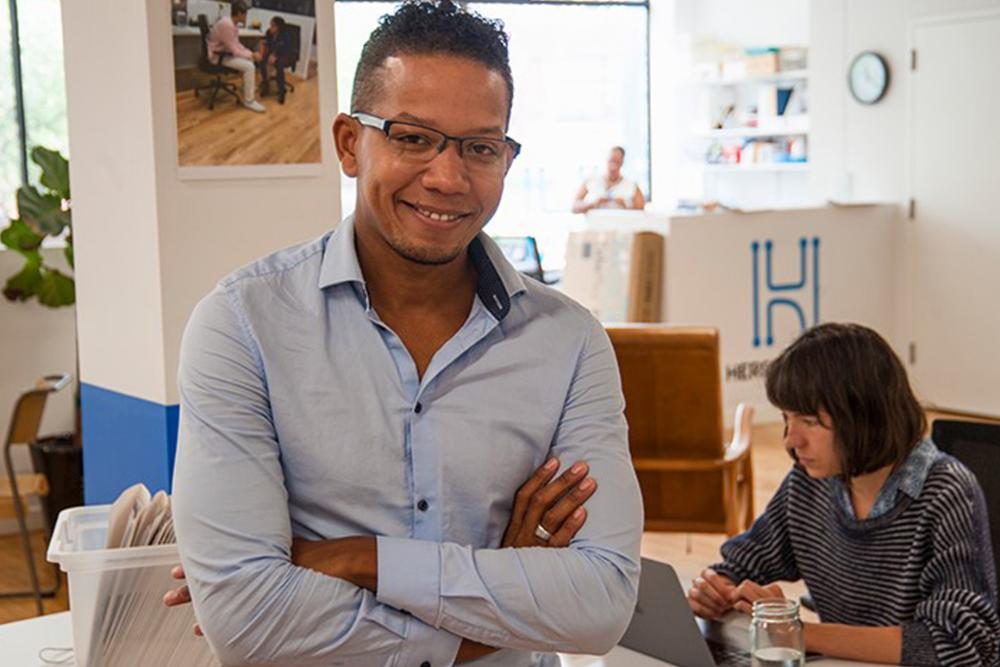
Marist alumnus Dr. Edward Summers ’04/’06M, founder of Bronx-based the Thinkubator, has been named to Robin Hood’s Power Fund, a new initiative supporting leaders of color and their organizations.
Marist alumnus Dr. Edward Summers ’04/’06M, founder of Bronx-based the Thinkubator, has been named to Robin Hood’s Power Fund, a new initiative supporting leaders of color and their organizations. Robin Hood, New York City’s largest poverty-fighting organization, funds impactful and scalable solutions to lift families out of poverty. The Power Fund invests in leaders who share Robin Hood’s mission of increasing economic mobility while championing racial and economic justice. Summers has dedicated his career to economic development in his hometown of the Bronx.To combat the barriers leaders of color face in accessing philanthropic dollars, the Power Fund takes a three-fold approach: a meaningful investment in an organization; targeted capacity-building and technical support; and a self-directed investment in the leader’s own development and elevation. The Power Fund was seeded with an initial investment of $10 million by Robin Hood and investors such as the Stavros Niarchos Foundation, BlackRock, and Capital One.In 2020, Summers founded the Thinkubator, an innovative nonprofit that provides education, career, and work-based learning opportunities for low-income youth in the Bronx. The Thinkubator harnesses their creativity through a youth-led design thinking consultancy, internships, workforce training, career development, job placement, a Youth Council, educational programming, and advocacy. With financial support from the Power Fund, the Thinkubator can now enhance and expand its work. Said Summers, “I am excited, humbled, and honored by this opportunity to elevate the work and impact of the Thinkubator. I look forward to the transformational impact this funding will have on our organization and on the youth and communities we serve.”A two-time Marist graduate, Summers served for seven years as Presidential Fellow and a member of the senior leadership team under Marist President Dennis J. Murray. He is currently on the College’s Alumni Executive Board as well as its Diversity & Inclusion Alumni Advisory Board.
21 Jul 2021
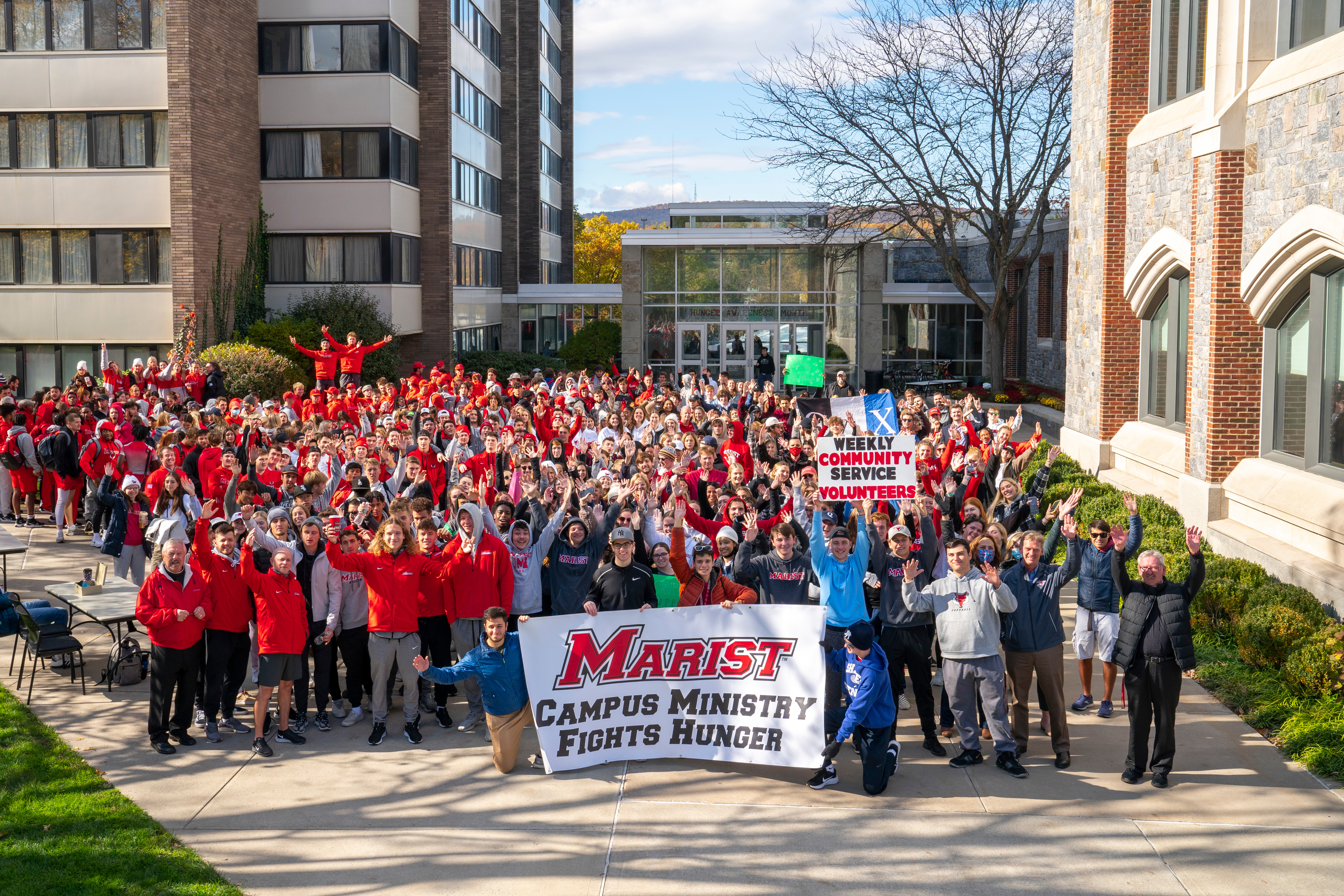
The Hunger Walk takes place for the 29th year.
On Nov. 3, Marist students continued the tradition of the Hunger Walk for the 29th year. The walk was part of Hunger Month, a program organized each November by Campus Ministry.More than 600 people took part in the approximately 30-minute walk around the campus. Students donated $3 each. A total of $1,167 was raised, according to Br. Michael Flanigan, FMS, who has coordinated the Hunger Walk for the past 13 years.Additional activities during Hunger Month include the collection of non-perishable food and Buck Hunger, the collection of donations of a dollar or more.The food is donated to the food pantry at Dutchess Outreach of Poughkeepsie. The cash donations are made to Bread for the World, Lazarus House (Lawrence, MA), the Guadalupe Middle School in Brownsville, TX, and the Lunch Box Soup Kitchen at Dutchess Outreach.
16 Nov 2021
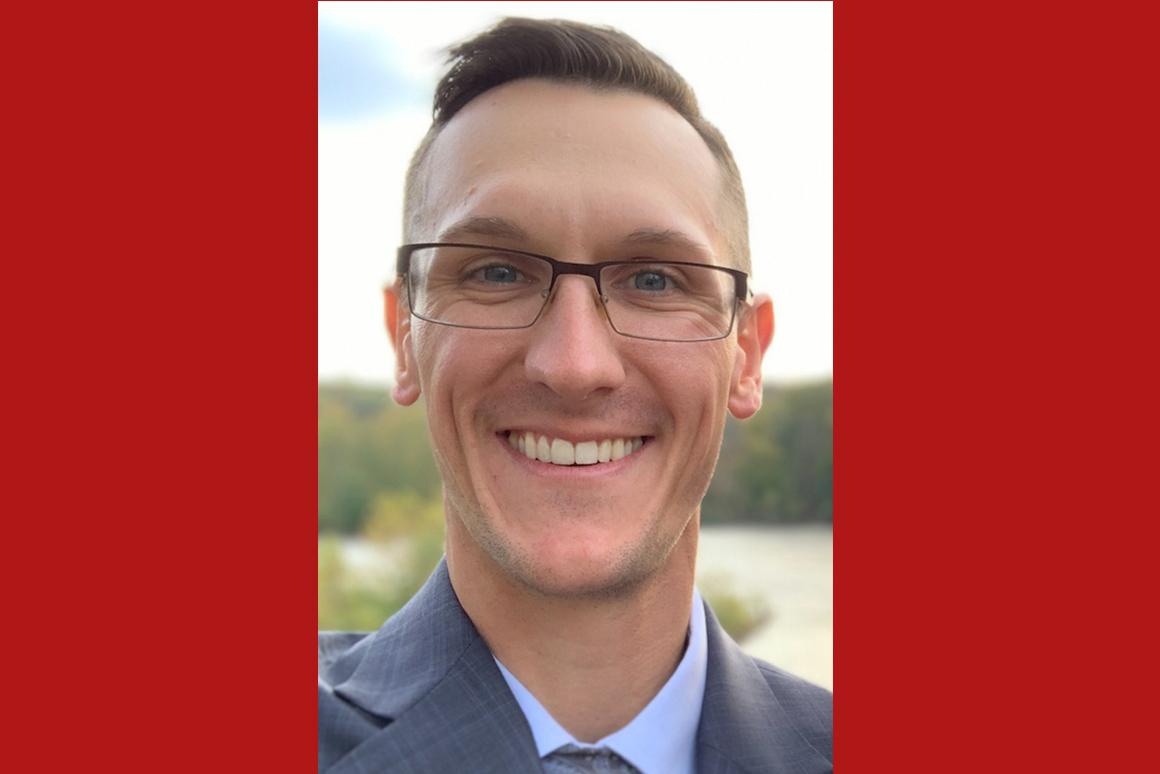
Matthew Szymaszek, DO, has been helping people fight the coronavirus from the outset of the pandemic.
Matthew Szymaszek, DO, has been helping people fight the coronavirus from the outset of the pandemic.The Simsbury, CT, native and long-distance runner for the Marist track and field team graduated in 2007 but returned to the College to finish research that he started with Dr. Zofia Gagnon, a former associate professor of environmental science, before taking the MCAT — the Medical College Admission Test, a standardized test that is part of the medical school admissions process — in 2008. He began medical school at the Lake Erie College of Osteopathic Medicine in Erie, PA, where he met his wife, Lindsey, in 2009. After originally settling down in Delaware, the couple moved to Colorado. In the fall of 2019 Szymaszek started working in critical care for Pulmonary Associates in Colorado Springs, CO. Just a few months later, the world was rocked by the coronavirus. In March 2020, his work environment started changing. “I don’t think there was a single non-COVID patient at one time, and we have a couple different ICUs,” he said about the period around Thanksgiving 2020. “I think one of our towers — 16 beds — was all coronavirus patients, all on ventilators.”As the weeks and months went on, more data and research showed that there were more than just respiratory issues to deal with, namely blood clots that formed in kidneys. Still, day-to-day responsibilities didn’t change all that much. Szymaszek’s routine, he said, consists of “seeing everybody, making sure their work of breathing hadn’t changed, making sure they didn’t develop any other secondary organ disfunction — particularly, any kidney dysfunction — and then it’s symptomatic management after that.” Workplace efficiency, Szymaszek explained, was the primary way his job changed. “Taking care of patients is the primary focus,” he said, “but certainly, you still have to document everything that you’re doing. I think that was the biggest time crunch — trying to see everybody, making sure you weren’t missing anything, making sure all the nurses’ needs were addressed, talking with families.” Since the information about the virus was so fluid, the latter task was time-consuming and difficult to address. Hospital procedures and operation plans were updated daily, primarily in the limitation of visitors at the hospital and how to avoid clutter in ICUs. Patients were admitted to higher levels of care only when their need for additional oxygen escalated. Szymaszek and the other doctors gave input to the hospital’s higher-ups as well as each other. “It was our anecdotal experiences day in and day out that we would share with one another and learn from those things,” he said. One experience that proved to be an astute observation by one of the doctors was the beneficial impact of steroids. Results in the Randomized Evaluation of COVID-19 Therapy (RECOVERY) trial involving hospitalized patients with COVID-19 showed that using dexamethasone over 10 days improved mortality.Learning from experience was a critical part of fighting an unknown enemy. “Our system as a whole, early on, developed a treatment algorithm as things were evolving and coming out of other countries,” Szymaszek said. The components of that algorithm have been and continue to be in flux. At first, they used convalescent plasma donations from recovered patients, which contain antibodies that can fight off the virus. Treatments that have been mainstays, Szymaszek explained, are steroids (such as dexamethasone and Solu-Medrol) and anticoagulation medicines, which help protect against blood clots.Of course, no treatments were discovered to be a magic wand. Steroids brought along problems in people with preexisting conditions, namely with blood-sugar levels. “That’s always been an ongoing battle…because they’re on high-dose steroids off and on for weeks and weeks,” Szymaszek said. “And if they have already have some underlying diabetes and other issues, it just becomes a nightmare to get those things under control.”Vaccines initially slowed the progression of cases and severity of disease, but the advent of the delta variant has only spurred more hospitalizations and unprecedented "crisis standards" of care for some hospital systems. “We continue to have a steady influx of patients infected with coronavirus not just from the local community but also from hospital systems both in and out of the state,” said Szymaszek. “In the beginning of the pandemic, most patients were hospitalized with COVID and there was a noticeable decline in other medical conditions such as stroke or cardiac conditions and even trauma-related cases. Now, we have an increase in both COVID and other medical conditions which is why trying to find open beds for some systems is a challenge. At this stage of the pandemic the vast majority of cases can be prevented with vaccination, and yes, there are going to be breakthrough cases as more people are vaccinated, but the chances of requiring hospitalization or death are incredibly reduced. “The science is constantly evolving and I think that's what is hard for people to understand. What we knew a year or a few months ago may not be true today as we continue to learn more about this virus and its variants.” Szymaszek has paved himself numerous different paths to unwind and get away from work. One of the reasons the Szymaszeks moved to Colorado was to be close to Lindsey’s family so that her parents could help watch their children. Another was that it offered them plenty of outdoor activities. It’s a gold mine for the outdoorsy couple, who live on the north side of Garden of the Gods Park, in the foothills of Pikes Peak Mountain, and within hours of numerous skiing resorts. Szymaszek likes hiking, biking, fly fishing, and taking his boys — six-year-old Owen and five-year-old Evan — walking on nature trails. “My boys are in school and a local mask mandate has dramatically cut cases and quarantines for students and teachers when compared to when it was optional.”Staying true to his roots as a long-distance runner, Szymaszek competes in time trials with his college teammates. The pool of competitors features Sean Hopkins ’05, Sean Prinz ’06, Justin Harris ’07, Michael Schab ’06, and Michael Rolek ’08. Out of boredom during quarantine time, Prinz proposed the idea of doing competitions to stay active. They would pick various events and share the results with each other.Head coach Pete Colaizzo ’86 remembers Szymaszek — or as he called him, CT, the abbreviation for his home state — as “one of the highest-mileage guys on the team,” he said. “Always ran a lot. Always ran twice a day — early morning runs, late night runs, in addition to our practices. He’s the type of guy you just want on the team.” Szymaszek continues to participate in triathlons and half Ironmans, with more races on the horizon this winter and spring. For him, running has always been more than exercise; it’s an emotional outlet.“I don’t think I would have been able to get through med school if it weren’t for the running,” he said. “That was the only thing that was consistent, [that] I knew I could rely on, to go out and clear my mind, think about stuff. That certainly still holds true now.”
21 Jul 2021

We are excited to offer this online directory of alumni-owned businesses for alumni to list their business and for fellow alumni to support alumni-owned businesses around the world.
We are excited to offer this online directory of alumni-owned businesses for alumni to list their business and for fellow alumni to support alumni-owned businesses around the world.If you are a Marist graduate and own a business or are a partner in a business and you'd like to include it in the business directory, click here to submit your listing.*The Alumni Office has the right to remove a business listing at any time. To search the Alumni Business Directory, click http://maristconnect.marist.edu/businessdirectory.*Terms of UseThe use of information contained within for solicitation or any reason other than supporting a business is strictly prohibited. Marist College does not endorse or make any other representations concerning any of the businesses registered in the Directory.
20 Aug 2021